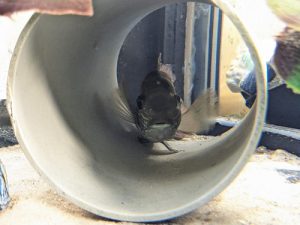
University of Bristol scientists have illustrated how predators overcome the erratic behavior of their prey during the hunt by adjusting their own.
The study challenges the widely-held belief that unpredictable behavior helps animals survive encounters with predators.
Instead of just running directly away from a predator, many prey species flee in a surprisingly wide range of directions, and scientists believe this helps them evade capture.
Researchers from Bristol’s School of Biological Sciences studied how real predatory fish (blue acara cichlids) to test how true this belief is. Their research however suggests that predators can easily neutralize this behavior by adjusting their own behavior.
The robotic prey started the process motionless, before fleeing when the cichlid got too close. The key design feature of programming their escape direction in advance allowed the researchers vary how predictable the escape direction was over a series of encounters with the predators.
Dr. Andrew Szopa-Comley, lead author, explained ‘Using robotic prey allowed us to present individual predators with one of two prey escape strategies: “predictable” prey which repeatedly escaped in the same direction from one interaction with the predator to the next, or “unpredictable” prey which escaped in random directions.’
Predators facing predictable prey changed their speed of approach according to the escape direction of the prey, moving faster when the prey was heading directly away from them, and slower if the prey were fleeing sideways. This adjustment started before the prey attempted to escape, suggesting that the predators could somewhat anticipate the prey’s behavior, perhaps based on the experience of previous encounters. On the other hand, predators facing unpredictable prey did not adjust their approach speed to match the prey’s escape angle.
However, over the length of the whole pursuit, the predators chasing unpredictable prey performed as well as those facing predictable prey. They compensated by increasing their speed in the later stages of the pursuit.
Dr. Christos Ioannou, senior author, said ‘Our results suggest that the predators in our study were able to overcome the potential downsides of facing prey which behave unpredictably. From the prey’s point of view, this raises the question of whether unpredictable behavior is as widely beneficial as was originally thought.’
This research is significant to the evolution of prey escape behavior.
Dr. Szopa-Comley added, ‘One of the key messages from our research is that predators are capable of dynamically adjusting their behavior in a way that can have dramatic consequences for the success of prey survival strategies.’
By Marvellous Iwendi.
Source: University of Bristol